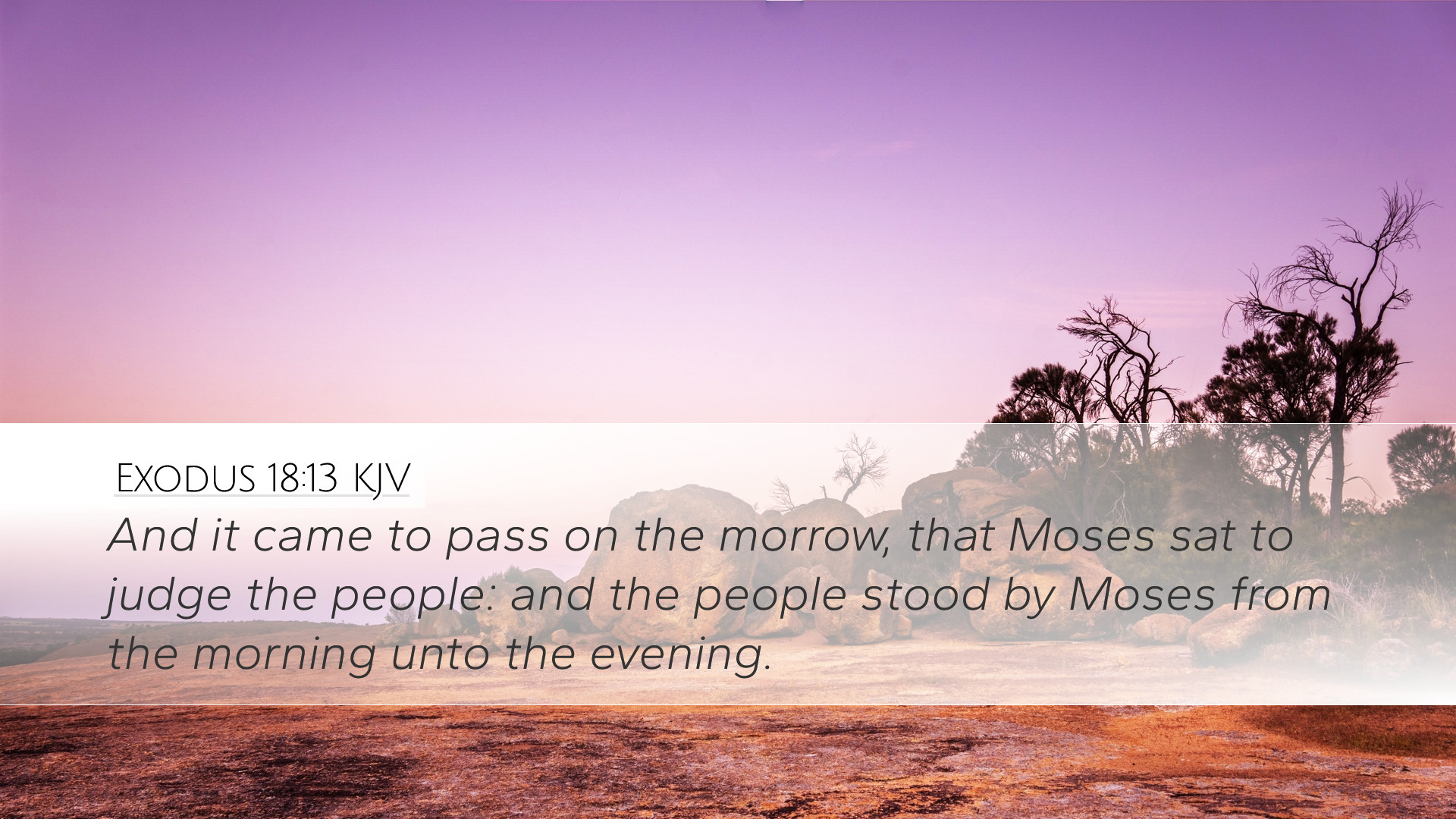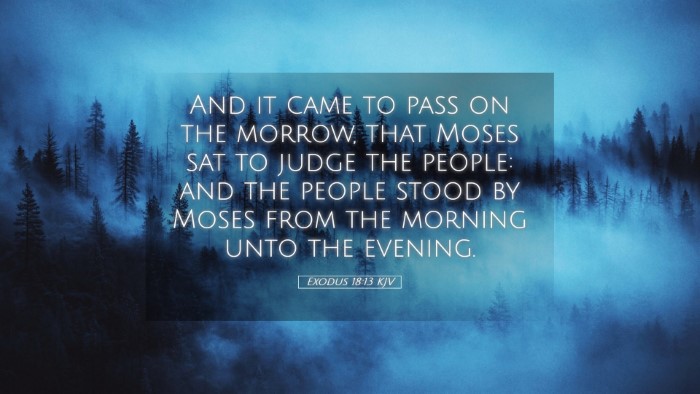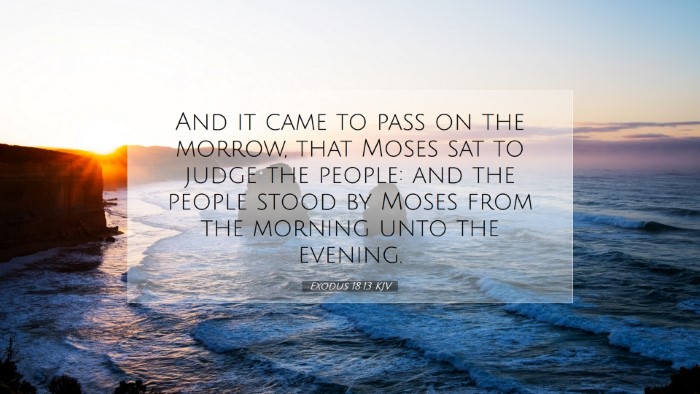Commentary on Exodus 18:13
Exodus 18:13 states: "And it came to pass on the morrow, that Moses sat to judge the people: and the people stood by Moses from the morning unto the evening." This verse introduces significant themes concerning leadership, justice, and the burdens of authority within the context of Israel's nascent community.
Summary of Context
This incident occurs after the Israelites have escaped from Egypt, and Moses is in a position of significant leadership. He is tasked with not only guiding the people but also interpreting the law and mediating disputes among them. This highlights both the necessity of communal order in a newly formed nation and the weight of the responsibilities placed upon Moses.
Insights from Public Domain Commentaries
Matthew Henry’s Commentary
Henry emphasizes that Moses assumed the role of a judge, engaging with each person's cases and dilemmas, which exposes the weight of leadership. He points out that the process was not just administrative but also relational; Moses interacted directly with the people, indicating his personal investment in their lives.
Henry notes the time-consuming nature of this task, stating that the people stood before Moses “from the morning unto the evening.” This illustrates a few crucial points: the demand placed on Moses due to the lack of delegation, the people's eagerness to seek justice, and the arduous nature of rulership.
Albert Barnes’ Commentary
Barnes elaborates on the judicial aspect of Moses' role, recounting how Moses acted as a mediator between God and the people. He suggests that this necessitated a great amount of wisdom and discernment. Moses was not merely a figurehead but actively participated in delivering God’s commandments and ensuring that the community adhered to them.
He also offers critical reflection on the exhaustion that comes from such extensive responsibility, urging leaders not to take on too much without seeking assistance. The verse serves as a reminder of the need for wisdom in governance and the importance of support from those in authority.
Adam Clarke’s Commentary
Clarke touches upon the dual burden of spiritual and civil leadership inherent in Moses' role. He asserts that this verse illustrates the demands of being a leader both in faith and in community affairs. Clarke posits that the overwhelming nature of Moses’ responsibilities foreshadows the advice he would later receive from his father-in-law, Jethro, to delegate authority.
Clarke highlights the significance of the people’s role in seeking justice. It underscores their trust in Moses but also sets the stage for necessary changes in governance. He believes that the lengthy hours Moses spent judging the people indicate the eagerness of the people to receive guidance and make their grievances known.
Thematic Analysis
-
Leadership and Authority:
This verse reveals the complexities of spiritual and civil leadership. Moses stood as an intermediary who bore the burdens of his people, reflecting on the necessity of divine wisdom and human empathy in guiding a community.
The lack of delegation eventually necessitated change, as leaders must recognize their limits and seek out supportive structures for governance.
-
Justice:
Justice is a central theme in this passage. Moses’ role signifies the importance of fair judgement and resolution within a community. The principle of seeking justice is foundational in the establishment of a societal framework that values ethical conduct.
In seeking help from Moses, the people illustrate the human longing for fairness and righting wrongs, which continues to resonate through theological discussions on justice today.
-
Community Engagement:
The verse furthermore highlights the engagement of the people in communal life. Their willingness to stand before Moses from morning until evening signifies their commitment to the rule of law and their faith in God as mediated through Moses.
This emphasizes the role of communal participation, showcasing how governance must include the voices and concerns of the people it serves.
Practical Applications
-
Leadership Development:
This passage serves as a call to leaders to develop a framework for shared leadership and delegate responsibilities wisely so that they do not become overburdened and lose their effectiveness.
It encourages the formation of supportive structures where leaders can operate efficiently while also maintaining spiritual integrity.
-
Community Justice:
For contemporary believers, the emphasis on justice resonates strongly. Churches and communities are encouraged to establish mechanisms for conflict resolution that embody fairness and accessibility.
This involves training leaders and laypersons alike in principles of justice and active listening.
-
Faithful Mediation:
As Moses mediated between God and the people, Christians today are called to be mediators of grace and truth, reflecting the character of Christ in their dealings with others.
This means advocating for the marginalized and ensuring that all voices are heard in matters of community interest and spiritual significance.
Conclusion
Exodus 18:13 encompasses profound insights into leadership, community, and justice. By learning from Moses’ example, modern-day leaders, scholars, and believers can find relevance in ancient wisdom, seeking to cultivate environments of justice, compassion, and collaborative leadership. The richness of this text lies not only in its historical context but in its enduring significance for those called to serve and guide in various capacities today.


